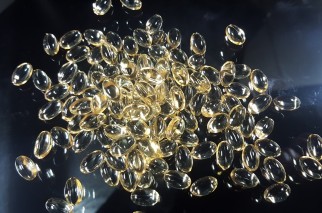 his week a report in a journal called Alzheimer's Disease Diagnosis,
Assessment & Disease Monitoring claimed that Vitamin D supplements
reduce the incidence of Alzheimer's disease.[1] It was widely
cited in the press, but is it a good study? Here is my unsolicited peer review.
his week a report in a journal called Alzheimer's Disease Diagnosis,
Assessment & Disease Monitoring claimed that Vitamin D supplements
reduce the incidence of Alzheimer's disease.[1] It was widely
cited in the press, but is it a good study? Here is my unsolicited peer review.
It was not a clinical trial and no patients were studied. Instead, it's a statistical analysis of a database in the National Alzheimer's Coordinating Center at the University of Washington.
The dataset contains longitudinal records of 12,388 patients without dementia who were measured over time. The authors analyzed the database statistically and found that patients “on” four forms of vitamin D (cholecalciferol, ergocalciferol, calcium-vitamin D, and combinations) had 40% lower rate of getting dementia. 68.4% of D− (“without” vitamin D) and 83.6% of D+ patients (“with” vitamin D) had a five-year dementia-free survival. About 80.9% of the dementia was AD and the rest was mostly DLB or unrecorded dementia subtypes.

A picture of vitamin D capsules, in case anyone doesn't know what they look like
Statistically this is a big effect, but there are big problems with the data. The groups were: 7,751 with “no exposure” to vitamin D before diagnosis vs 4,637 who claimed to have had vitamin D exposure at baseline. The baseline population was not balanced. The D+ group was 70.5% female while the D− group was 46.9% female. The exposure groups differed highly significantly in years of education, race, cognitive dysfunction (MCI), and depression, though they did not differ in age or ApoE ε4 status.
The authors say vitamin D protected females more than males (49% vs 26% lower incidence of dementia). Patients with mild cognitive impairment and carriers of ε4 had higher incidence of dementia, as expected. There was no difference by race. It's all very suggestive of an effect, except for one little detail: there is no indication of how the “exposure” to vitamin D was determined. This means it came from personal reports, which means the patients filled out a form asking whether they were taking any supplements. If they forgot, they wouldn't have checked that box.
This detail is glossed over in the article. The authors say things like “nine participants were on both ergocalciferol and cholecalciferol” without specifying what that means. Who put them “on” it? How do we know they were really taking it? How much did they take, how often, why, and when? Was the vitamin actually absorbed? Are the patients' recollections accurate? Did they continue to take it for the ten years they were followed, or only at baseline? This is a flaw in the design because patient recollections are being correlated with a disease that severely affects memory well before it is diagnosed.
In their discussion the authors make plausible speculations as to what might be happening, but they admit they don't know what the blood levels of D were. They write:
In our study, we had no information on the dosages of calcium and vitamin D taken nor the baseline vitamin D and calcium levels. . . . Furthermore, differences in socioeconomic status (SES) across participants may have contributed to differences in exposure to vitamin supplementation. Individuals with higher SES may have been more likely to take vitamin supplements. SES may also be associated with healthy lifestyles, pace of biological aging, and risk of dementia. Studies have shown that lower levels of education and wealth were associated with accelerated biological aging, faster memory decline, and substantially greater risk of dementia. While we included education in our models, the NACC dataset has a dearth of information related to SES and therefore, SES differences could not be accounted for in our study.
Finally, we have no information about the reason for visiting an ADRC, especially for individuals NC [with normal cognition], or for taking vitamin D supplements.
It's impossible to say something prevented something else if you have no way of knowing if they took it. Obviously people would like to believe this story, especially as it would reduce the risks of taking one of the highly toxic treatments that Big Pharma keeps producing. But even vitamin D can be harmful in high doses; nutritionists often recommend taking it along with calcium and vitamin K, and it's generally agreed that getting it from sunlight is better.
While the study is certainly not junk science, it would have been much more convincing if somebody had actually measured something.
[1] Ghahremani M, Smith EE, Chen HY, Creese B, Goodarzi Z, Ismail Z. Vitamin D supplementation and incident dementia: Effects of sex, APOE, and baseline cognitive status. Alzheimers Dement (Amst). 2023 Mar 1;15(1):e12404. doi: 10.1002/dad2.12404. PMID: 36874594; PMCID: PMC9976297. Link
mar 16 2023, 4:43 am
